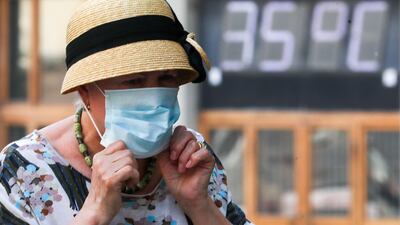Health problems tied to climate change are all getting worse as threats from food and water insecurity, heatwaves and infectious diseases are exacerbated.
The Lancet Countdown delivers a bleak assessment of a future blighted by extreme temperatures and rising health threats.
The annual reports commissioned by The Lancet medical journal tracked 44 global health indicators connected to climate change, including heat deaths, infectious diseases and hunger.
“Climate change is here and we're already seeing it damaging human health across the world,” said Anthony Costello, executive director of The Lancet Countdown. “As the Covid-19 crisis continues, every country is facing some aspect of the climate crisis too.”

This year's reports, billed as “code red for a healthy future”, highlight dangerous trends:
- Vulnerable populations — older people and the very young — were subject to more time in dangerous heat last year. For people over 65, the researchers calculated there were 3 billion more “person-day” exposures to extreme heat than the average from 1986 to 2005.
- More people were in places where climate-sensitive diseases can flourish. Coastline areas warm enough for the Vibrio bacteria increased in the Baltics, the US north-east and the Pacific north-west in the past decade. In some poorer nations, the season for malaria spreading mosquitoes has expanded since the 1950s.
“Code Red is not even a hot enough colour for this report,” said Stanford University tropical medicine professor Dr Michele Barry, who was not part of the study team. Compared with the last Lancet report, “this one is the sobering realisation that we’re going completely in the wrong direction.”
In the US, heat, fire and drought caused the biggest problems. An unprecedented Pacific north-west and Canadian heatwave hit this summer, which a previous study showed could not have happened without human-induced climate change.
Study co-author Dr Jeremy Hess, a professor of environmental health and emergency medicine at the University of Washington, said he witnessed the impact of climate change while working at Seattle emergency rooms during the heat.
“I saw paramedics who had burns on their knees from kneeling down to care for patients with heat stroke,” he said. “And I saw far too many patients die” from the heat, he said.
Another ER doctor in Boston said science is now showing what she has seen for years, and she cited asthma caused by worsening allergies as one example.

“Climate change is first and foremost a health crisis unfolding across the US,” said Dr Renee Salas, also a co-author of the report.
George Washington University School of Public Health Dean Dr Lynn Goldman, who was not part of the project, said health problems from climate change “are continuing to worsen far more rapidly than would have been projected only a few years ago.”
The report said 65 of the 84 countries included subsidise the burning of fossil fuels, which causes climate change. Doing that “feels like caring for the desperately ill patient while somebody is handing them lit cigarettes and junk food”, said Dr Richard Jackson, a UCLA public health professor.


